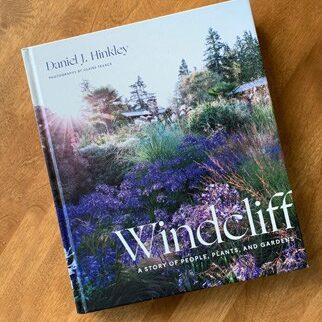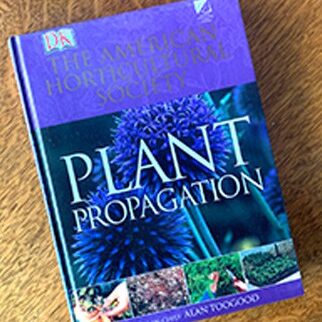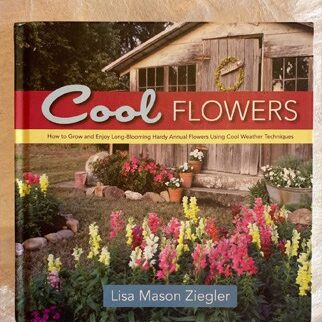Books for Gardeners

Skagit Master Gardeners Share Favorites from Their Bookshelves
By Ginny Bode, Skagit County Master Gardener
Since I was young, I remember the happiness of curling up with a good book as the holiday festivities came to a close. Whether I found a book in the library or received it as a gift, my memories of books and Christmas go hand in hand. Now, often the non-fiction book in my hand is gardening related.
As a recent trainee and now graduate of Skagit County’s WSU Master Gardener program, a new world of books has opened. Early in the program we were taught to find scientifically-proven solutions for the challenges gardeners face instead of anecdotal remedies. Program leaders shared the best reference books for plant propagation, identification, pruning, even noxious weeds and pests found in our area.
The key identifier among Master Gardeners is desire to learn, particularly in their area of focus. When joining the program, I soon became aware that I was among people who not only shared my interest in growing plants, they were also very generous in sharing their knowledge and resources.
To create this list of books for gift giving I solicited fellow Master Gardener classmates for their recommendations to include along with those of program teachers. The following books are top-of-mind choices for both inspiration and reference this holiday season.
For Inspiration:
Windcliff by Dan Hinkley
It may look like a coffee table book, but Windcliff by Dan Hinkley is so much more than stunning photographs. Renowned plant hunter Dan Hinkley shares the stories of creating his two private gardens, Heronswood and Windcliff on Washington’s Kitsap peninsula. Through these stories he captures what it means to be a gardener. His warm prose with the photographs makes this a book you’ll go back to often, putting words to the passion for plants and creating outdoor spaces.
Animal, Vegetable, Miracle by Barbara Kingsolver
This book by best-selling fiction writer Barbara Kingsolver tells the story of the year she and her family attempted to live off only what they could grow or buy locally. An early proponent of the ‘eat local’ movement, Kingsolver brings to life our connection with the food we eat and the value of making meals together.
Handbook of Northwest Gardening by Anne Lovejoy
Considered a classic read for gardeners, Anne was one of the first to write about using organic techniques in the ornamental garden. Focused on building a sustainable garden, Lovejoy emphasizes good soil preparation, composting, mulching, and--the Master Gardener mantra—Right Plant, Right Place.
Skagit Authors:
Erin Benzakein’s books Discovering Dahlias, The Cut Flower Garden and a Year in Flowers, are an excellent resource for gardeners whose focus is growing flowers to share as well as to create a profitable business.
A Little Bit of Land by Jessica Gigot
This recent publication by Jessica Gigot opens the door for readers to her life as a sustainable farmer in the Skagit Valley. The joys and challenges of small scale farming, as well as making her way in an often male-dominated industry, and the path that led her to our valley.

Hinkley’s warm prose with stunning photographs captures his passion for plants and creating outdoor spaces.

The American Horiticultural Society's Plant Propagation book is a go-to reference for propagating plants in Skagit Master Gardener's plant house at the Discovery Garden.
For Nuts and Bolts Learning:
Cool Flowers by Lisa Mason Ziegler
Between the first frost in November, and the warmer days of spring, we long to bring in the first blooms of spring and enjoy the beauty inside the home. Lisa Ziegler’s book Cool Flowers explains how to get a jump on early spring blossoms. She profiles over 25 long blooming ‘hardy annuals’ which can be planted during cool conditions rather than waiting for the warmth of spring. Embracing the Master Gardener mantra, Right Plant, Right Place, local gardeners have applied her techniques in our climate with gorgeous results.
American Hort. Society’s: Plant Propagation by Alan Toogood
Rather than taking an unvetted opinion from the Internet, seasoned Master Gardeners use this book as a go-to reference guide for propagating almost any plant. If you’re wondering when to cut, where to cut, when to use root hormone, or when just a cup of water works fine, you’ll find this fully illustrated guide to be an indispensable resource for multiplying your favorite plants.
Kew Gardener Guides:
The Kew Gardens, part of England's Royal Botanical Gardens is home to 27,000 plant species and subspecies. The science gained from their garden research is captured in a wide range of books for gardeners, including many children’s books. The company’s garden books cover topics as diverse as growing drought friendly plants, medical plants, and recipes for what you grow.
The Apple Grower: A Guide for Growing Organic Apples by Michael Phillips
Looking for a way to grow good fruit organically? Orchardist and researcher Michael Phillips first wrote The Apple Grower almost twenty years ago. Now updated, Phillips guides readers through creating a healthy orchard ecosystem as well as evaluating natural strategies against pests.
100 Plants to Feed the Bees: Provide a Healthy Habitat to Help Pollinators Thrive by The Xerces Society
Bees play a critical role in our ecosystem. This user-friendly guide helps home gardeners create a healthy environment for pollination. Readers will be inspired by this book's pictures and for attracting bees, butterflies or hummingbirds, learning how to protect and attract bees throughout the season.
When giving books for gardeners, unless they are pure photo inspiration (which truly has its place on a dark January evening in the PNW) look for books with clear instructions, pictures and/or illustrations. Look for climate relevance, i.e., while the world of succulents is enticing, many can be challenging to protect through our Northwest winters. Books listing both the common name and the proper name are helpful for both the seasoned and novice gardener. Find a book for a specific interest if known, i.e., bird feeding, vegetable growing in small spaces, kitchen gardens, or nature around us.
We live in one of the most wonderful places on earth for gardening. Joining the Master Gardener program for many is like finding your tribe. Whatever your growing focus is, the Skagit County WSU Extension Master Gardener program is an excellent resource for those interested in plants and learning to grow better.
----
Questions about home gardening or becoming a master gardener, may be directed to: WSU Skagit County Extension Office, 11768 Westar Lane, Suite A, Burlington, WA 98233; by phone: 360-428-4270; or via the website: www.skagit.wsu.edu/mg
Washington State University Extension helps people develop leadership skills and use research-based knowledge to improve economic status and quality of life. Cooperating agencies: Washington State University, U.S. Department of Agriculture, and Skagit County. Extension programs and policies are available to all without discrimination. To request disability accommodations contact us at least ten days in advance.
